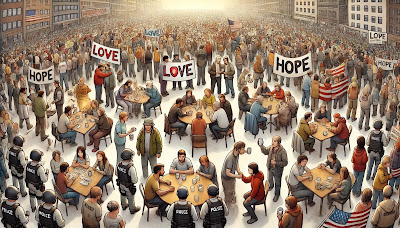When I started this blog in 2013, my guiding scripture was Matthew 25:40: "Truly I tell you, whatever you did for one of the least of these brothers and sisters of mine, you did for me." That hasn’t changed. If anything, it’s become more urgent.

The America I Thought I Knew
Before I moved to America in 2003, I believed that Americans had it all. Sure, I knew there were problems—poverty, homelessness, political tensions—but I had this idea that at its core, America was a land of security and opportunity. Where people felt a depth of patriotism that meant people fought and worked to make the country better for all. The country that, for all its faults, still believed in fairness.
There were a few things that rocked my beliefs. The shock of the expensive medical system hit me first. I still remember the first time I saw a hospital bill—you mean people actually go bankrupt just for getting sick? They lose insurance when they lose their job—and they can lose their job due to sickness??
Then came the moments of overhearing casual racism spoken so freely, like it was nothing. Someone used a racial slur in front of me without batting an eye, assuming I'd naturally agree with them. And the women’s rights issues—especially in the workplace—felt like something from another era compared to what I was used to in Europe.
But over the past 20 years, I’ve also watched real progress. Tangible progress. Laws demanding equal pay for equal work. Stronger protections against workplace discrimination. A growing recognition that diversity in higher education isn’t just some feel-good ideal—it actually benefits society.
So how is it that now, in 2025, I’m watching these hard-won gains be unraveled?
What Happens When the Floor Drops Out?
I used to believe that even if things got bad, the core of who we are as a country—the foundation of democracy, of basic decency—would hold. I don’t know if I believe that anymore. Or at least, I no longer take it for granted.People I once thought loved America deeply—loved the ideals of freedom, equality, and justice—have shocked me. It turns out, they love a man much more. And as he tears at the fabric of the Constitution, stretching it beyond its limits, testing who will actually stop him, I feel something tearing at my own soul as well as that of the nation, and at the morals of people I once admired.
Because it isn’t just a political crisis. It’s a moral one. A spiritual one. It’s about who we are as a nation, but also who we are as neighbors, as friends, as coworkers. And as activists.
The Burden of Seeing Clearly
I know I’m not alone in feeling the weight of this moment. The exhaustion doesn’t just come from fighting—it comes from witnessing. From seeing the truth while others deny it. From feeling like you’re screaming into the void while so many around you pretend nothing is wrong.
Empathy has always been a double-edged sword. It’s what calls us to action, but it’s also what makes this all so heavy. How do you keep going when it feels like the same battles must be fought over and over? When the same warnings go unheard? When justice never seems to arrive in time—or worse, when it feels like justice has walked out building and might not be back?
Holding the Fire, Not the Ashes
I don’t have an easy answer. But I do know this: I refuse to let the fire die. Not because I have endless energy, not because I’m some unwavering source of hope, but because letting it go out isn’t an option. Letting this happen is. not. an. option.So we do what we can to keep going. We rest when we need to. We lean on each other. We grieve, because there is grief in watching what we love be dismantled. But we don’t let the grief consume us. When you feel that happening: Stop. Breathe. And practice whatever it is you need to do to reset yourself.
Maybe faith means believing that even now, the work matters. Maybe it means trusting that even when we step back, others will step forward. Maybe it means remembering that the least of these—whoever they are, wherever they are—have never been abandoned by God, even when the world turns against them.
America may be burning, but we Americans do not have to burn with it.
And I don’t know what happens next. But I know we will not face it alone.


